

Cybercrime and the law: a review of UK computer crime legislation. Introduction At various times over the last few years, we’ve posted comments on different aspects of UK computer crime legislation, and the policing of cybercrime, on our weblog (4 November 2005; 12 May 2006; 26 January 2006; 28 July 2006; 15 September 2006).
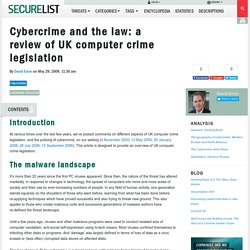
This article is designed to provide an overview of UK computer crime legislation. The malware landscape It’s more than 20 years since the first PC viruses appeared. Since then, the nature of the threat has altered markedly, in response to changes in technology, the spread of computers into more and more areas of society and their use by ever-increasing numbers of people. Until a few years ago, viruses and other malicious programs were used to conduct isolated acts of computer vandalism, anti-social self-expression using hi-tech means. This has changed. Who's Responsible? - Computer Crime Laws. While the internet has revolutionized business and communication almost overnight, laws regulating its use and misuse haven't developed as swiftly.
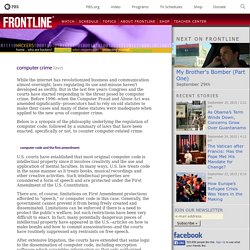
NZLC - Report 54: Computer Misuse - Title Page. You are here: NZLII >> Databases >> New Zealand Law Commission >> Report >> R54 >> Title page [Database Search] [Name Search] [Next] [Download] [Help] Te Aka Matua o te Ture Report 54 May 1999 Wellington, New Zealand.
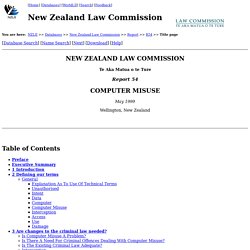
Cyber criminals target law firms - NZ Law Society. “Law firms are attractive targets for cyber criminals,” says Ken McCallum, head of cyber security at the United Kingdom Department for Business, Innovation and Skills in an article for the Law Society Gazette, journal of the Law Society of England and Wales.
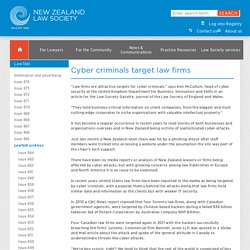
“They hold business-critical information on client companies, from the biggest and most cutting-edge corporates to niche organisations with valuable intellectual property.” It has become a regular occurrence in recent years to read stories of both businesses and organisations overseas and in New Zealand being victims of sophisticated cyber attacks. Just last month a New Zealand retail chain was hit by a phishing attack after staff members were tricked into accessing a website under the assumption the site was part of the chain’s tech support. Four Canadian law firms were targeted again in 2011 with the hackers successfully breaching the firms’ systems. “We’re boy scouts, right? She’ll be right. FindLaw - Practical legal articles from FindLaw New Zealand.
More Articles like this in:Criminal LawScience & TechnologyIT & the Internet New Computer CrimesAuthor: Simpson Grierson The Love Bug virus, the Code Red worm, identity theft, denial of service attacks, hacking - cyber crime is increasingly impacting on our lives.
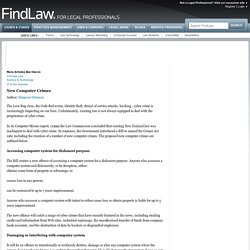
Unfortunately, existing law is not always equipped to deal with the perpetrators of cyber crime. In its Computer Misuse report, (1999) the Law Commission concluded that existing New Zealand law was inadequate to deal with cyber crime. NSWSCL - Is Australian Criminal Law up to the threat of computer viruses? Infos Thursday, 06 October 2005 19:48 Graduate at Law, Patrick Ling examines Australia's legislative answer to cyber criminals and the viruses they create.

Patrick also examines the adequacy of the current regime in dealing with viruses. Finally, Patrick looks at how the proposed model criminal code will deal with this issue. by Patrick Ling, Graduate at Law As the use and dependency upon computers and the Internet rapidly increases, the incidence of criminal activity has also risen. Although computer crime refers to a whole range of different activities, one form, which has received widespread media coverage in recent times, is the computer virus.
The worldwide spread of the 'Melissa virus' and 'Love bug' raises the question as to whether a successful prosecution under our existing laws could be achieved against the creator and distributor of such a virus. anywhere in the world poses a greater risk to computer users compared to virus transfer via infected floppy disks. 3.1 US v Morris. NATIONAL SECURITY for the 21st Century. Virus: A Retrospective - Legal Implications. Legal Implications [Introduction] [Computer Fraud and Abuse Act] [Viruses and the Law] [Need for Improvement] [Sources] Introduction to Cybercrime [Top] In May of 2000 CBS News did a report on the contemporary "Hacking Culture".
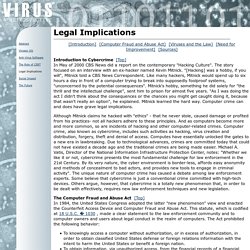
The story focused on an interview with an ex-hacker named Kevin Mitnick. "[Hacking] was a hobby, if you will", Mitnick told a CBS News Correspondent. Like many hackers, Mitnick would spend up to six hours a day in front of a computer trying to break into supposedly foolproof systems, "unconcerned by the potential consequences". Although Mitnick claims he hacked with "ethics" - that he never stole, caused damage or profited from his practices- not all hackers adhere to these principles. The Computer Fraud and Abuse Act [Top] In 1984, the United States Congress adopted the latter "new phenomenon" view and enacted the Counterfeit Access Device and Computer Fraud and Abuse Act.
100403-5959 IJECS-IJENS. Colombell, Volume VIII Issue 3, Richmond Journal of Law & Technology. Volume VIII, Issue 3, Spring 2002 by: Mark R.
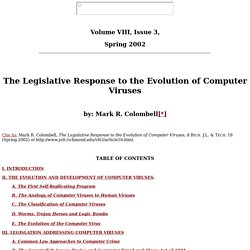
Colombell[*] Cite As: Mark R. Colombell, The Legislative Response to the Evolution of Computer Viruses, 8 RICH. A. A. 1. A. 1. . {1}On July 19, 2001, and again on July 31, 2001, the United States Government was attacked by a worm. . {2}The impact of the Nimda virus and the Code Red worm are just two examples of how people’s social and professional lives are dependent on computers.
. {3}A problem facing state, federal, and international governments is the need to contain the growth of “computer virus” crime. . {4}A computer virus is defined as a “program or piece of code that is loaded onto your computer without your knowledge and runs against your wishes.”[3] Computer viruses, which are man-made, replicate themselves like cancerous cells and then infect and possibly disable a computer or an entire network.
A. B. . {7}Computer virus programs penetrate personal computers and networks in a number of ways. . {8}A computer virus works in the same manner. C.